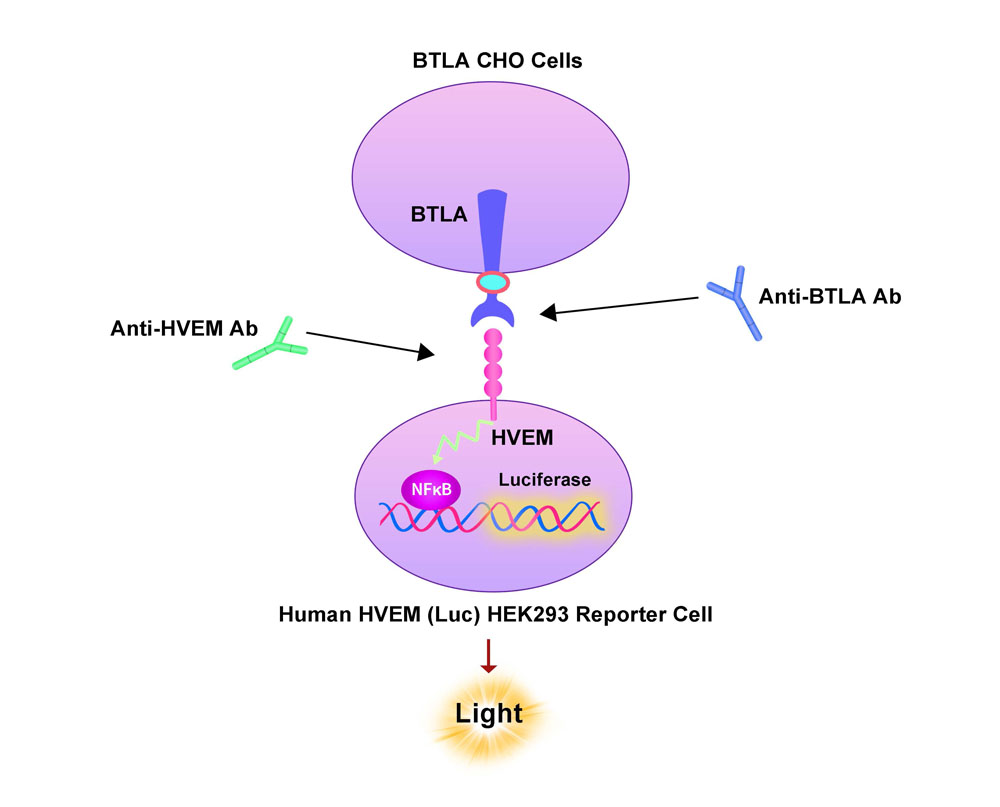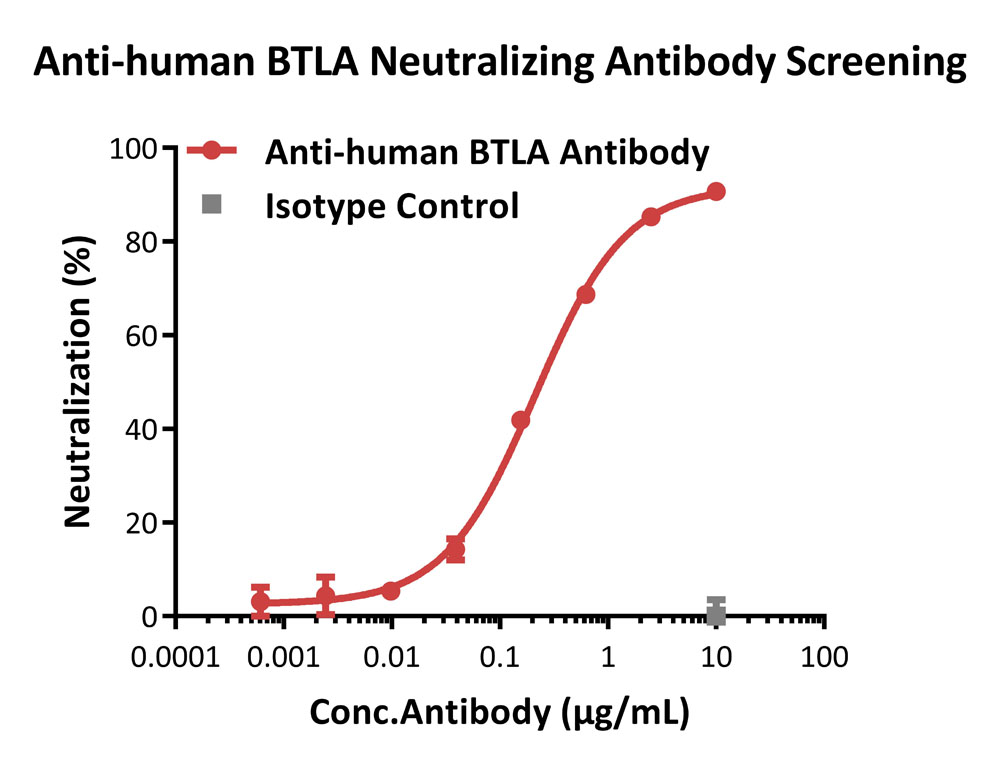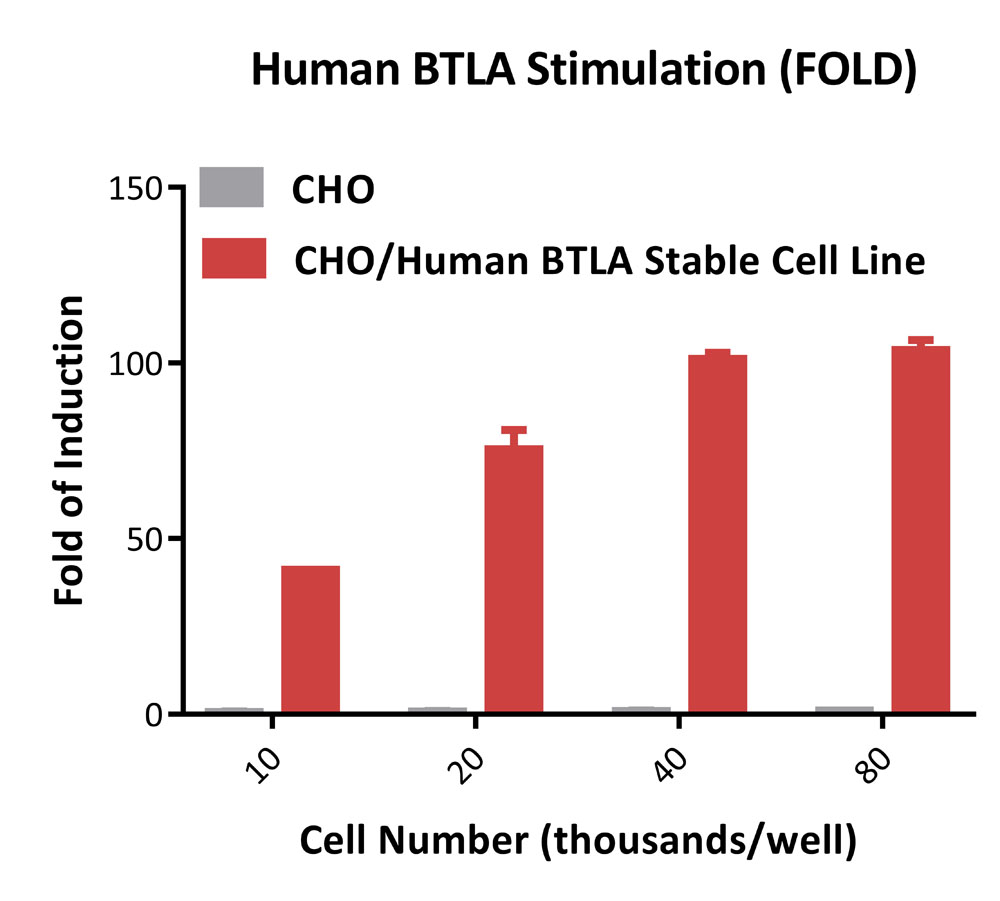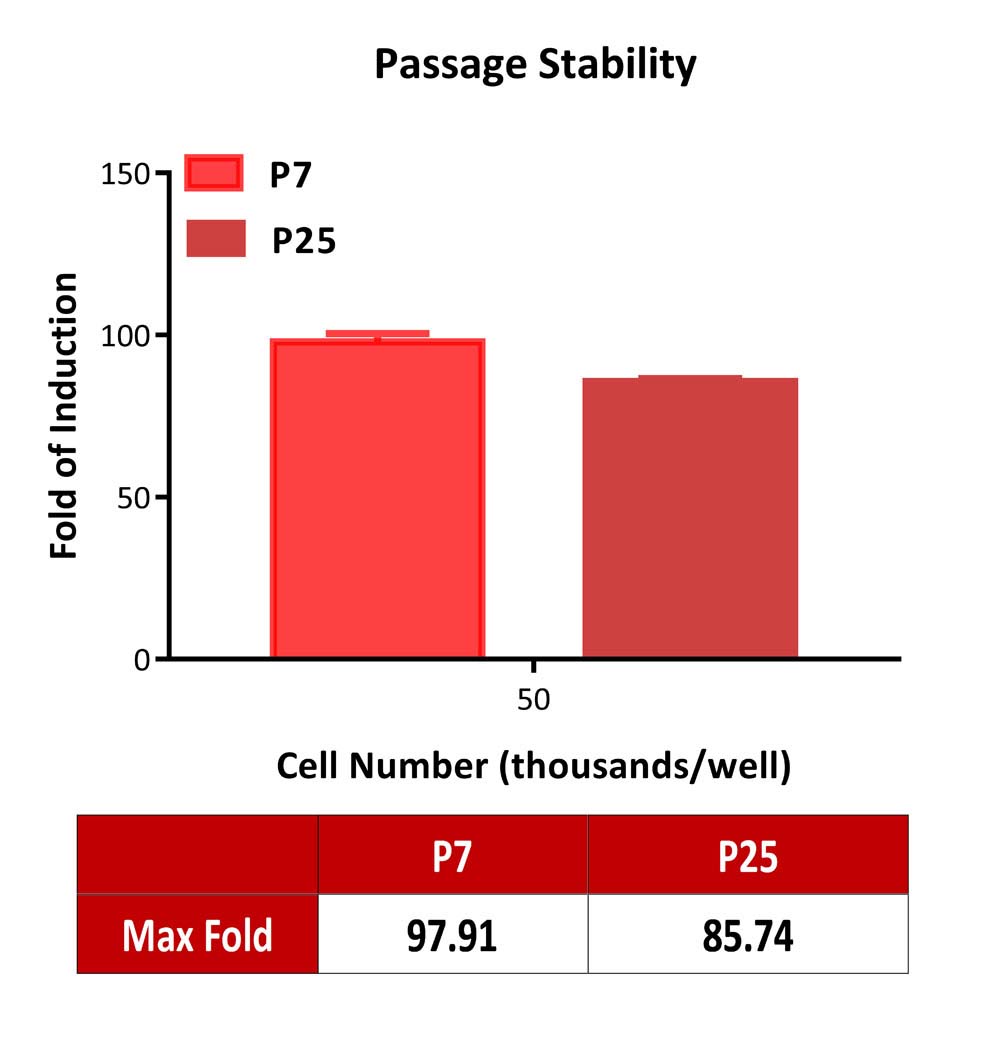- Genetically modified cell lines best reflect MOA (Mechanism of Action)
- Higher activity and larger assay window for robust and reproducible cell-based bioassay
- Comprehensive application data to support assay development and validation
- Full tracible record, stringent quality control and validated cell passage stability
- Parental cell line legally obtained from internationally recognized cell resource bank and commercially licensed
- Global commercial license assistance whenever regulatory filing is required
描述(Description)
The Human HVEM (Luc) HEK293 Reporter Cell was engineered to not only express NF-kB signaling response element, but also express the receptor full length human HVEM (Gene ID: 8764). When co-cultured with target cells expressing human BTLA, the BTLA/HVEM interaction drives NF-kB-mediated luminescence. Blocking the BTLA/HVEM interaction by either anti-BTLA or anti-HVEM antibodies results in a decrease in luminescence.
应用说明(Application)
• Screen for anti-human BTLA antibody or anti-human HVEM antibody blocking BTLA/HVEM interaction.

生长特性(Growth Properties)
Adherent
筛选标记(Selection Marker)
Hygromycin B (20 μg/mL)
培养基(Complete Growth Medium)
DMEM medium + 10% FBS
冻存液(Freeze Medium)
Serum-free cell cryopreservation medium
装量(Quantity)
1 vial contains at least 5×10^6 cells in 1 mL serum-free cryopreservation medium
存储(Storage)
Frozen in liquid nitrogen.
支原体检测(Mycoplasma Testing)
Negative
无菌检测(Sterility Testing)
Negative
使用说明(Instructions for Use)
See data sheet for detailed culturing and assay protocol.
Receptor Assay

Expression analysis of human HVEM on Human HVEM (Luc) HEK293 Reporter Cell by FACS.
Cell surface staining was performed on Human HVEM (Luc) HEK293 Reporter Cell or negative control cell using
PE-labeled anti-human HVEM antibody
Protocol
Application

Inhibition of human BTLA overexpressing on CHO cells induced reporter activity by anti-human BTLA antibody.
This reporter cell was incubated with serial dilutions of antibodies in the presence of CHO/Human BTLA Stable Cell Line. The EC50 of anti-human BTLA neutralizing antibody is approximately 0.212 μg/mL.
Protocol
Signaling Bioassay

Response to human BTLA (FOLD).
This reporter cell was incubated with CHO/Human BTLA Stable Cell Line (Cat. No. SCCHO-ATP110) at four different cell densities. The human BTLA overexpressing on CHO cells can activate HVEM signaling with the max induction fold 103.69 at the density of 8x10^4 cells/well.
Protocol
Passage Stability

Passage stability analysis by Signaling Bioassay.
The continuously growing Human HVEM (Luc) HEK293 Reporter Cell was incubated with CHO/Human BTLA Stable Cell Line (Cat. No. SCCHO-ATP110). The human BTLA overexpressing on CHO cells stimulated response demonstrates passage stabilization (fold induction) across passage 7-25.
Protocol
如有相关细胞池需求请联系我们
背景(Background)
Herpesvirus entry mediator (HVEM) is also known as TNFRSF14, TR2 (TNF receptorlike molecule) and ATAR (another TRAF associated receptor), is a type I membrane protein belonging to the TNF/NGF receptor superfamily. HVEM expression has been detected in peripheral blood T cells, B cells, monocytes and in various tissues enriched in lymphoid cells. The extracellular domain of HVEM has been shown to interact directly with the herpes simplex virus envelope glycoprotein D (gD). Two TNF superfamily ligands, including the secreted TNFβ (lymphotoxin α) and the membrane protein LIGHT (lymphotoxins, exhibits inducible expression, and competes with HSV glycoprotein D for HVEM, a receptor expressed by T lymphocytes), have been shown to be the cellular ligands for HVEM. Besides HVEM, LIGHT can also interact with LTβR, the receptor for lymphotoxin αβ heterotrimer. The role of the HVEM LIGHT /LTβ receptor ligand pair in immune function and herpesvirus pathobiology remains to be elucidated.
Limited Use&License Disclosure
BY USE OF THIS PRODUCT, RESEARCHER AGREES TO BE BOUND BY THE FOLLOWING TERMS OF LIMITED USE OF THIS CELL LINE PRODUCT.
- If the researcher is not willing to accept the terms of limited use of this cell line product, and the product is unused, ACRO will accept return of the unused product.
- Researchers may use this product for research use only, no commercial use is allowed. "Commercial use" means any and all uses of this product and derivatives by a party for profit or other consideration and may include but is not limited to use in: (1) product manufacture; and (2) to provide a service, information or data; and/or resale of the product or its derivatives, whether or not such product or derivatives are resold for use in research.
- This cell line is neither intended for any animal or human therapeutic purposes nor for any direct human in vivo use . You have no right to share, modify, transfer, distribute, sell, sublicense, or otherwise make the cell line available for use to other researchers, laboratories, research institutions, hospitals, universities, or service organizations.
- ACROBIOSYSTEMS MAKES NO WARRANTIES OR REPRESENTATIONS OF ANY KIND, EITHER EXPRESSED OR IMPLIED, WITH RESPECT TO THE SUITABILITY OF THE CELL LINE FOR ANY PARTICULAR USE.
- ACROBIOSYSTEMS ACCEPTS NO LIABILITY IN CONNECTION WITH THE HANDLING OR USE OF THE CELL LINE.
- Modifications of the cell line, transfer to a third party, or commercial use of the cell line may require a separate license and additional fees. Please contact order.cn@acrobiosystems.com for further details.























































 膜杰作
膜杰作 Star Staining
Star Staining












